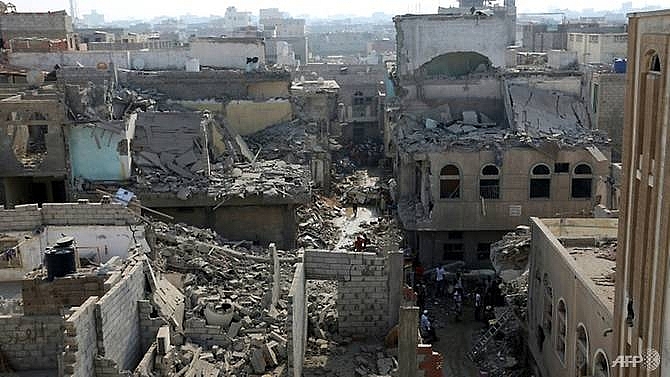UN to convene Yemen talks in Geneva next month
 |
| UN envoy Martin Griffiths urged world powers to support the new push for peace negotiations in Yemen, whose war is described as the world's worst humanitarian crisis. (Photo: AFP/Stringer) |
Martin Griffiths told the Security Council that "a political solution" to end the war in Yemen was "available" and urged world powers to support the new push for peace negotiations.
"These consultations will provide the opportunity for the parties, among other things, to discuss the framework for negotiations, relevant confidence-building measures and specific plans for moving the process forward," said Griffiths.
UN-brokered political talks on Yemen broke down in 2016 amid demands for a rebel withdrawal from key cities and power-sharing with the Saudi-backed government.
Since 2015, Saudi Arabia has been leading a military campaign to restore the internationally recognized government to power and push back the Huthis, who still hold the capital Sanaa.
The war has left nearly 10,000 people dead and unleashed what the United Nations describes as the world's worst humanitarian crisis.
At least 20 people were killed on Thursday in an air strike at the entrance to a hospital in the Red Sea port of Hodeida and the bombardment of a fish market in the city.
Strikes have picked up around the city since the Saudis last week accused the Iran-aligned Huthis of attacking two oil tankers operated by one of the kingdom's companies in the waters of the Red Sea.
Griffiths told the council that he was "still trying" to negotiate a deal to avoid a full-blown battle for Hodeida, which is a key entry point for humanitarian aid.
Resolving the crisis over Hodeida would have to be part of a "comprehensive political settlement" between the rebels and the government, he said, suggesting that the talks would take place despite fighting on the ground.
HODEIDA COULD BE A FLASHPOINT
The envoy expressed concern that "Hodeida could be a flashpoint" that could derail the push for talks in September and urged the council to support de-escalation in the port city and "keep the Red Sea out of the conflict."
Appointed last year to lead UN peace efforts in Yemen, Griffiths said there had been progress in talks on a possible deal with the Huthis to turn over control of the port to the United Nations "but the gap is not closed."
US Ambassador Nikki Haley voiced strong support for the UN effort to bring both sides to the table in Geneva, telling Griffiths that the parties must "understand that they need to work with you."
The United States, along with France and Britain, have supported the Saudi coalition in its military campaign in Yemen, but has expressed concern over the heavy toll on civilians.
"Civilians are at risk, infrastructure is at risk, and we as the international community have to demand that the two parties come together and understand the seriousness of this," said Haley.
She added that airstrikes that almost crippled the water supply in Hodeida "are starting to show a disregard for the people on the ground in a time when they are already suffering so much."
UN aid official John Ging described the humanitarian crisis in Yemen as "shocking, both in scale and severity."
More than 22 million people - 75 per cent of the population - are in dire need of aid including 8.4 million who are on the brink of famine, he said.
Since Jun 1, violence in Hodeida has forced more than 340,000 people from their homes across the governorate.
What the stars mean:
★ Poor ★ ★ Promising ★★★ Good ★★★★ Very good ★★★★★ Exceptional
Related Contents
Latest News
More News
- Russian President congratulates Vietnamese Party leader during phone talks (January 25, 2026 | 09:58)
- Worldwide congratulations underscore confidence in Vietnam’s 14th Party Congress (January 23, 2026 | 09:02)
- Political parties, organisations, int’l friends send congratulations to 14th National Party Congress (January 22, 2026 | 09:33)
- 14th National Party Congress: Japanese media highlight Vietnam’s growth targets (January 21, 2026 | 09:46)
- 14th National Party Congress: Driving force for Vietnam to continue renewal, innovation, breakthroughs (January 21, 2026 | 09:42)
- Vietnam remains spiritual support for progressive forces: Colombian party leader (January 21, 2026 | 08:00)
- Int'l media provides large coverage of 14th National Party Congress's first working day (January 20, 2026 | 09:09)
- Vietnamese firms win top honours at ASEAN Digital Awards (January 16, 2026 | 16:45)
- ASEAN Digital Ministers' Meeting opens in Hanoi (January 15, 2026 | 15:33)
- ASEAN economies move up the global chip value chain (December 09, 2025 | 13:32)

 Tag:
Tag:




















 Mobile Version
Mobile Version